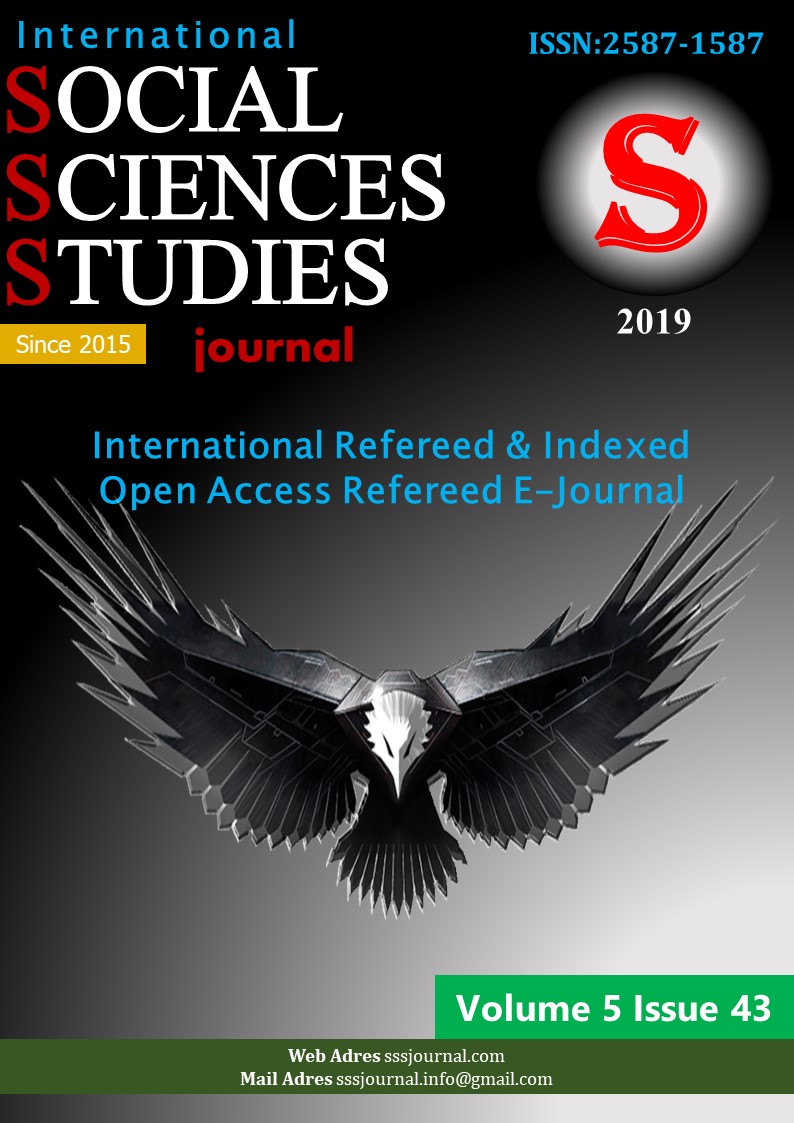Hafif Mental Retarde Çocuklara Sahip Ebeveynlerin Yas Tepkilerinin Sosyo-Demografik Özelliklerine Göre İncelenmesi
Author :
Abstract
Bu araştırma hafif mental retarde çocuklara sahip ebeveynlerin, bu durumdan dolayı yaşadıkları yas tepkilerinin sosyo demografik özelliklerine göre incelenmesini kapsamaktadır . Araştırma; 2018-2019 Eğitim ve Öğretim yılının, İstanbul ili Sarıyer, Kağıthane, Eyüp İlçelerindeki 6-12 yaş aralığındaki wisc-r zeka testine göre hafif mental retarde tanısı almış çocukların ebeveynlerini kapsamaktadır. Araştırmaya 150 anne ve 150 baba olmak üzere 300 hafif mental retarde çocuğa sahip anne/baba katılmıştır. Çalışmada ebeveynlerin çocuklarının tanısından sonraki dönemde yas süreçlerini incelemek için “Yas Ölçeği”,” ve araştırmada yer alan ebeveynlerin demografik özelliklerini tanımlamak için “Kişisel Bilgi Formu” uygulanmıştır. Analizde frekans dağılımı, t-testi, tek yönlü varyans (One Way Anova), scheffe post-hoc, pearson korelasyon, spearman rho analiz teknikleri uygulanmıştır. Araştırma sonucunda hafif mental retarde çocuklara sahip ebeveynlerin yas süreci sosyo demografik değişkenlere göre farklılaşıp farklılaşmadığı incelendiğinde olumlu cevap verilmektedir. Yas ölçeğinde annelerin toplam yas puanıyla kendilerinin kaçıncı evlilik yaptığı arasında ve eşlerinin (babaların) kaçıncı evlilik yaptığı arasında pozitif yönlü anlamlı ilişkiler bulunmuştur. Babaların toplam yas puanı ile kendilerinin kaçıncı evliliği yaptığı ve eşlerinin (annelerin) kaçıncı evlilik yaptığı arasında da pozitif yönlü anlamlı ilişkiler bulunmuştur. Annelerin yas ölçeği davranışsal alt boyutunda annelerin yaşına göre farklılaştığı bulunmuştur. Annelerin yas ölçeği duygusal alt boyutundan elde edilen puan ortalamaları öğrenim düzeyine göre farklılaştığı bulunmuştur. Babaların yas ölçeği davranışsal alt boyutunda ve toplam yas puan ortalamasında öğrenim düzeyine göre anlamlı bir fark görülmüştür.
Keywords
Abstract
This research covers reviewing the grief process of the parents with children who have mild mental retardation in terms of their socio-demographic characteristics. The research covers the parents whose children between the ages of 6-12 in the 2018-2019 academic year in Sarıyer, Kağıthane, Eyüp districts of the İstanbul province received the diagnosis of mild mental retardation according to the wisc-r intelligence test. 300 parents, 150 of whom are mothers and 150 of whom are fathers, who have children with mild mental retardation, participated in the research. “Grief Scale” was applied in the study in order to examine the grief process in the period after the diagnosis of the parents' children, and ‘Personal Information Form’ was applied to define the demographic characteristics of the parents involved in the research. In the analyses, frequency distribution, t-test, one way analysis of variance (One Way ANOVA), scheffe post-hoc, pearson correlation, spearman rho analysis techniques were applied. As a result of the research, positive answers have been given when reviewing whether the grief process of the parents who have children with mild mental retardation differs or not according to socio-demographic variables. In the grief scale, significant positive relations were found between the total grief score of the mothers and the number of marriages they had and the number of marriages of their spouses (fathers). Significant positive relations were also found between the total grief score of the fathers and the number of marriages they had and the number of marriages of their spouses (mothers). It was found that the behavioral subscale of the mothers' grief scale differed according to the age of the mothers. It was found that the point averages which were obtained from emotional sub-dimension of the mothers' grief scale differed according to their education level. A significant difference was seen in behavioral subscale of the fathers' grief scale and total grief point average according to education level.
Keywords
- Aysan, F., Özben, G. (2007) Engelli Çocuğu Olan Anne Babaların Yaşam Kalitelerine İlişkin Değişkenlerin İncelenmesi. Buca Eğitim Fakültesi Dergisi. 22, 1-6
- Balcı Çelik, S. (2006). Yas Ölçeği: Geçerlik ve Güvenirlik Çalışması. Türk Psikolojik Danışma ve Rehberlik Dergisi,3(25), 105-114.
- Cohen, J. (1992). A power primer. Psychological bulletin, 112(1), 155-159.
- Cohen, S., Wils, T.A. (1985). Stres, social support, and the buffering hypothesis. Psychological Bulletin. 310–357
- Çürük, N. (2008). Ankara İl Merkezinde Bulunan Milli Eğitim Bakanlığı’na Bağlı İş Okullarında 1. ve 4. sınıfa Devem eden Zihinsel engelli Çocukların Annelerinin Kaygı ve Sosyal Destek Düzeylerinin Karşılaştıkları Problemlere Göre İncelenmesi. Yüksek Lisans Tezi. Gazi Üniversitesi, Eğitim Bilimleri Enstitüsü, Ankara.
- Dereli, F., Okur, S. (2008). Engelli Çocuğa Sahip Ailelerin Depresyon Durumunun Belirlenmesi, Yeni Tıp Dergisi, 25, 164-158
- Erez, M. (2012). 7-11 Yaş Arası Özel Eğitim Gören Zihinsel Engelli Öğrenci Annelerinin Stres Belirtileri Ve Sosyal Kaygı Düzeyi Açısından Karşılaştırılması. Yüksek lisans tezi. İstanbul Arel Üniversitesi, sosyal bilimler enstitüsü. İstanbul
- Girli, A., Yurdakul, A., Sarısoy, M., Özekes, M. (2000). Zihinsel Engelli ve Otistik Çocukların Anne-
- Ende İnce, Z., Güdücü Tüfekçi, F. (2015). Engelli Çocuğu Olan Ebeveynlerde Evlilik Uyumu Ve Yaşam Doyumunun Değerlendirilmesi Ve Etkileyen Faktörlerin Belirlenmesi. Gümüşhane Üniversitesi Sağlık Bilimleri Dergisi 4(1).
- Mccubbin, A.M, Huang, S.T (1989) Family Strengths İn The Care Of Handicapped Children: Targets For
- Minners, P.M (1988). Family Resources And Sttres Associated With Having A Mentally Retarded Child. American Journal Of Mental Retardation 93 (2), 184 – 192
- Karaçengel, B. (2007). Zihinsel Engelli Çocuğa Sahip Anneler ile Sağlıklı Çocuğa Sahip Annelerin Atılganlık ve Suçluluk-Utanç Düzeyleri Açısından Karşılaştırılması. Yayınlanmamış Yüksek Lisans Tezi, Maltepe Üniversitesi, Sosyal Bilimler Enstitüsü, İstanbul.
- Karpat, D. (2011). Yaygın Gelişimsel Bozukluk Tanısı Alan Çocukların Ebeveynlerinin Yaşadığı Yas Tepkilerinin, Evlilik Uyumlarının ve Sosyal destek Algılarının İncelenmesi. Yüksek Lisans Tezi, Dokuz Eylül Üniversitesi, Eğitim bilimleri Enstitüsü. İzmir
- Köroğlu, E. (2018). DSM-5 Tanı Ölçütleri Başvuru El Kitabı. HYB Yayıncılık
- Kubler, R.E. (1969). On Deathand Dying, New York: New York : The Mac millan Company.
- Sarısoy, M. (2000). Otistik ve Zihinsel Engelli Çocuğa Sahip Ebeveynlerin Evlilik Uyumları. Yayınlanmamış Yüksek Lisans Tezi, Ege Üniversitesi, Sosyal Bilimler Enstitüsü. İzmir.
- Tabachnick, B.G., Fidell, L.S. (2015). Çok Değişkenli İstatistiklerin Kullanımı. Nobel Akademik. Ankara.
- Tekinarslan, İ.Ç. (2010). Zihinsel Yetersizliği Olan Öğrenciler. İ.H. Diken (Ed.). Özel Eğitime Gereksinimi Olan Öğrenciler ve Özel Eğitim içinde. Ankara: Pegem Akademi, 135-164.





